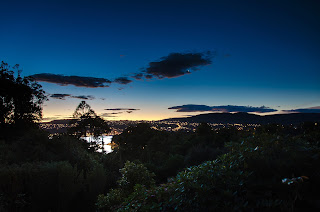Sitting in that chair before the service began. Photo (c) Audrey Whittaker
My family have gone and the house is quiet and tidy and spacious once again, and I'm kind of sorry about that. I had the best weekend ever.
On Friday evening Dean Trevor James and Rev'd Michael Wallace were responsible for a wonderful farewell service. Two of my brothers and my sister were present with their spouses, as I expected, and in the weeks leading up to it Clemency had arranged, unbeknownst to me, for my daughter Bridget, my son Nick and their respective families to be present. I realised this only when my bit of the procession got to the front pew and I saw Noah sitting on his Amma's knee. I heard the clang of my own jaw dropping on the floor.
After the service Trish Franklin MCed a session at which people said some very pleasantly surprising things about me. The Selwyn men presented me with a spine tinglingly formidable haka and the women, a waiata. I was given some chairs for our deck, a letter of recognition, and a significant monetary gift. There was a lovely card signed by hundreds of people.
For all of this I am so grateful. For those who travelled to be with me on this last official act of the my episcopacy, thank you. For the kindnesses shown, thank you. For the generosity of the people of our diocese, thank you. For all who made Friday night such a warm and embracing memory for me to look back on and hold to in the years ahead, thank you, thank you, thank you.
*****
Our house was pretty full, even though my siblings slept elsewhere. Bridget, my sister in law, was on an airbed in my study, Clemency and I had three nights in the caravan and my children and their children were scattered through the rest of the house. Children played in the garden, and on the deck and on the floor. The big gap was Catherine, who is still in London, but we did manage a Skype before she sets off for Bulgaria tomorrow. A few other friends and relatives popped in from time to time, so that our unhurried smorgasbord meals generally had 12-15 people present and were slotted into the unending, constantly morphing conversations. Our glass recycling container is the fullest I have seen it in a while, but no one drank too much, not even a little bit. We had a little trip to the butterfly house at the museum and another to St. Kilda Beach, but mostly we just enjoyed being together. My family together is a very congenial group. We know each other in a way which only decades of acquaintance allows, and our time together is marked by what is not present. There are no arguments, there's no rivalry, no talking about people behind their backs. There is tolerance, and acceptance and a deep liking of one another.









Comments